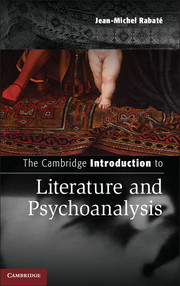Book contents
- Frontmatter
- Contents
- Acknowledgments
- Introduction
- Chapter 1 Freud’s theater of the unconscious
- Chapter 2 Literature and fantasy, toward a grammar of the subject
- Chapter 3 From the uncanny to the unhomely
- Chapter 4 Psychoanalysis and the paranoid critique of pure literature
- Chapter 5 The literary phallus, from Poe to Gide
- Chapter 6 A thing of beauty is a Freud forever
- Chapter 7 From the history of perversion to the trauma of history
- Conclusion
- Keywords and Index of Authors
- Bibliography
- Index
- References
Chapter 5 - The literary phallus, from Poe to Gide
Published online by Cambridge University Press: 05 September 2014
- Frontmatter
- Contents
- Acknowledgments
- Introduction
- Chapter 1 Freud’s theater of the unconscious
- Chapter 2 Literature and fantasy, toward a grammar of the subject
- Chapter 3 From the uncanny to the unhomely
- Chapter 4 Psychoanalysis and the paranoid critique of pure literature
- Chapter 5 The literary phallus, from Poe to Gide
- Chapter 6 A thing of beauty is a Freud forever
- Chapter 7 From the history of perversion to the trauma of history
- Conclusion
- Keywords and Index of Authors
- Bibliography
- Index
- References
Summary
If Schreber’s famous Memoirs can be considered as “literature,” this has important consequences for literary criticism. Literature can open up and include the innumerable autobiographical documents of madness and survival often classified as nonfiction or true testimonies in the “recovery” sections of bookstores and libraries. Literature can again be a province of biography or autobiography. Indeed, all the details provided by Schreber about his family, his wife, and the plan of his rooms are “true.” At the same time, we have understood that his delirium was “true” because it disclosed a fundamental principle of psychoanalysis: writing adheres to the symptom while keeping an intrinsic connection with extreme libidinal enjoyment, or the sublimation of terror and pain. This leads us to the vexed issue of “psychobiography” and the controversies to which the concept has given birth. After Freud’s own experiments with figures such as Jensen, Goethe, Shakespeare, Dostoevsky, Michelangelo, and Leonardo da Vinci, it was an American poet who bore the brunt of classical psychoanalytic investigation. Marie Bonaparte, one of the founders of the French psychoanalytic movement, and a personal friend of Freud, was the great-grand-niece of the emperor Napoleon; her enlightened assistance proved vital to Freud when it came time for him to leave Austria after the Nazis had taken over. Her monumental psychobiography of Poe was published in French in 1933 and prefaced by Freud, who praised it in glowing terms:
In this book my friend and pupil, Marie Bonaparte, has shone the light of psycho-analysis on the life and work of a great writer with pathologic trends.
Thanks to her interpretive effort, we now realise how many of the characteristics of Poe’s works were conditioned by his personality, and can see how that personality derived from intense emotional fixations and painful infantile experiences. Investigations such as these do not claim to explain creative genius, but they do reveal the factors which awaken it and the sort of subject matter it is destined to choose. Few tasks are as appealing as enquiry into the laws that govern the psyche of exceptionally endowed individuals.
Freud approves the project of a psychobiography: even if Poe was considered by some as a madman or a genius, or both, a patient analysis of his works buttressed by a reconstruction of his personal traumas and neuroses would disclose universal psychic laws.
- Type
- Chapter
- Information
- The Cambridge Introduction to Literature and Psychoanalysis , pp. 122 - 149Publisher: Cambridge University PressPrint publication year: 2014



